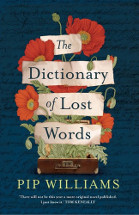The dictionary of lost words by Pip Williams

Affirm Press, 2020. ISBN: 9781925972597.
(Age: Secondary/Adult) Recommended. The story of Esme is set against
a time of immense change for women in Britain. She is part of the
tide sweeping the nation as it grapples with women's suffrage then
braces for war, a war which saw an acceleration of those changes
when women were drafted into the workforce.
Esme sits with her lexicographer father as he works in the
Scriptorium, a shed in Oxford where words are collected, discussed,
debated and given a place in the compilation of the Oxford English
Dictionary, or sometimes cast aside. Sitting beneath the table where
the scholars work, young Esme comes across a rejected slip with the
word 'bondmaid' and she scoops it up to put in Lizzie's trunk, the
first of many words pertaining to women, rejected by the
lexicographers. Lizzie has looked after her since her mother died,
and Esme questions whether Lizzie is a bondmaid, a question which
keeps resurfacing.
Over the years, Esme becomes one of the researchers in the
Scriptorium, a position usually only taken by men and she needs
special permission to enter the Oxford libraries, usually only open
to men. She meets an actress and is often seen at the theatre
watching her, only to become pregnant to her brother. Her child is
adopted by a couple who then move to Adelaide, and Esme returns to
her life in the Scrippy. Over the years she becomes more aware of
the position women have in society and emboldened, argues, usually
unsuccessfully, for words to be included in the dictionary.
She keeps on collecting words that are rejected, and she collects
some for herself. Her ear becomes attuned to new words, especially
by women unnoticed by scholars, and she writes them down with an
example of its use along with the author of the word and the date.
Lizzie's trunk becomes a repository of women's words, words that
will never find a place in the dictionary being compiled.
This wonderful tale, with the endearing characters of Esme and Lizzie
set alongside the reality of the Scriptorium, Dr Murray and his
researchers, resonates with authenticity as we watch the compiling
of this dictionary paralleling the emancipation of women but
oblivious to it. It is ironic that such a momentous change is barely
recognised by these men sitting in judgement over which words will
be included, and Esme's lost words underscore this irony, her 'Dictionary
of Lost Words' published privately by her husband as a token of
his love and esteem.
Throughout the story, words are presented which provoke thought and
deliberation, bringing the reader to question why these were not
included, and giving another layer of interest to an already highly
involving story.
Themes: Women's suffrage, Emancipation, World War One, Oxford
English Dictionary, Oxford, Lexicography.
Fran Knight